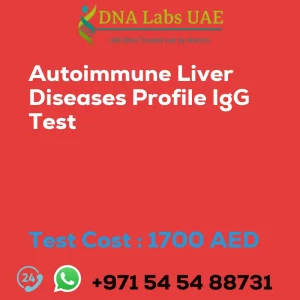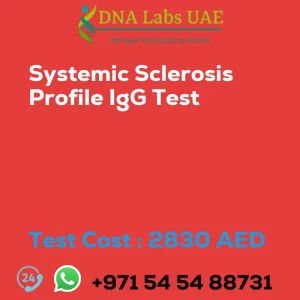EXTRACTABLE NUCLEAR ANTIGENS ENA/ANTI NUCLEAR ANTIBODIES ANA QUANTITATIVE PROFILE Test
Test Cost: AED 1640.0
Symptoms and Diagnosis:
The Extractable Nuclear Antigens (ENA)/Anti Nuclear Antibodies (ANA) Quantitative Profile test is a blood test that measures the levels of specific antibodies in the blood. These antibodies are directed against various nuclear antigens, which are proteins found in the cell nucleus. The test is used to help diagnose autoimmune disorders such as systemic lupus erythematosus (SLE) and Sjogren’s syndrome. These conditions can cause the immune system to mistakenly attack the body’s own cells and tissues.
The ENA panel typically includes testing for antibodies against several specific nuclear antigens, including Smith (Sm), Ro (SS-A), La (SS-B), Jo-1, and RNP. The ANA test is also included in this profile, which detects the presence of antibodies against a wide range of nuclear antigens. The results of the test are reported as antibody titers or levels.
A positive result indicates the presence of specific antibodies in the blood, which can help confirm a diagnosis of an autoimmune disorder. However, it is important to note that a positive result does not necessarily mean that a person has an autoimmune disease, as these antibodies can also be present in healthy individuals.
The ENA/ANA Quantitative Profile test is typically ordered by a healthcare provider when a person presents with symptoms suggestive of an autoimmune disorder, such as joint pain, fatigue, skin rashes, or dry eyes and mouth. It can also be used to monitor disease activity and treatment response in individuals already diagnosed with an autoimmune condition.
Test Components:
- Individual antibodies to:
- Sm
- U1RNP
- SS-A/Ro
- SS-B/La
- Jo-1
- Scl-70
- Centromere
Sample Condition:
3 mL (1.5 mL min.) serum from 1 SST. Ship refrigerated or frozen.
Report Delivery:
Sample Tue / Fri by 9 am; Report Same day
Method:
Enzyme Immunoassay
Test Type:
Autoimmune disorders
Doctor:
Physician, Rheumatologist
Test Department:
IMMUNOPATHOLOGY
Pre Test Information:
No special preparation required
| Test Name | EXTRACTABLE NUCLEAR ANTIGENS ENAANTI NUCLEAR ANTIBODIES ANA QUANTITATIVE PROFILE Test |
|---|---|
| Components | Individual antibodies to: *Sm*U1RNP*SS-A/Ro*SS-B/La*Jo-1*Scl-70*Centromere |
| Price | 1640.0 AED |
| Sample Condition | 3 mL (1.5 mL min.) serum from 1 SST. Ship refrigerated or frozen. |
| Report Delivery | Sample Tue / Fri by 9 am; Report Same day |
| Method | Enzyme Immunoassay |
| Test type | Autoimmune disorders |
| Doctor | Physician, Rheumatologist |
| Test Department: | IMMUNOPATHOLOGY |
| Pre Test Information | No special preparation required |
| Test Details |
The Extractable Nuclear Antigens (ENA)/Anti Nuclear Antibodies (ANA) Quantitative Profile test is a blood test that measures the levels of specific antibodies in the blood. These antibodies are directed against various nuclear antigens, which are proteins found in the cell nucleus. The test is used to help diagnose autoimmune disorders such as systemic lupus erythematosus (SLE) and Sjogren’s syndrome. These conditions can cause the immune system to mistakenly attack the body’s own cells and tissues. The ENA panel typically includes testing for antibodies against several specific nuclear antigens, including Smith (Sm), Ro (SS-A), La (SS-B), Jo-1, and RNP. The ANA test is also included in this profile, which detects the presence of antibodies against a wide range of nuclear antigens. The results of the test are reported as antibody titers or levels. A positive result indicates the presence of specific antibodies in the blood, which can help confirm a diagnosis of an autoimmune disorder. However, it is important to note that a positive result does not necessarily mean that a person has an autoimmune disease, as these antibodies can also be present in healthy individuals. The ENA/ANA Quantitative Profile test is typically ordered by a healthcare provider when a person presents with symptoms suggestive of an autoimmune disorder, such as joint pain, fatigue, skin rashes, or dry eyes and mouth. It can also be used to monitor disease activity and treatment response in individuals already diagnosed with an autoimmune condition. |








